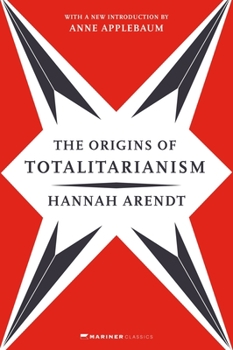The Origins of Totalitarianism
Select Format
Select Condition 
Book Overview
Hannah Arendt's definitive work on totalitarianism--an essential component of any study of twentieth-century political history--now with a new introduction by Anne Applebaum.
In recent years, The Origins of Totalitarianism has become essential reading as we grapple with the rise of autocrats and tyrannical thought across the globe.
The book begins with the rise of anti-Semitism in central and western Europe in the 1800s and continues with an examination of European colonial imperialism from 1884 to the outbreak of World War I.
Hannah Arendt then explores the institutions and operations of totalitarian movements, focusing on the two genuine forms of totalitarian government in our time, Nazi Germany and Stalinist Russia, which she adroitly recognizes were two sides of the same coin, rather than opposing philosophies of Right and Left. From this vantage point, she discusses the evolution of classes into masses, the role of propaganda in dealing with the nontotalitarian world, the use of terror, and the nature of isolation and loneliness as preconditions for total domination.
This edition includes an introduction by Anne Applebaum--a leading voice on authoritarianism and Russian history--who fears that "once again, we are living in a world that Arendt would recognize."
Customer Reviews
Rated 5 starsA book for ages to come
This book blew my mind. It's relevant, poignant and full of research to ponder for weeks.
2Report
Rated 5 starsA difficult book, but perhaps the best on the topic...
First let me say I read this book in reverse order. The text is divided into three sections, "Anti-Semitism," "Imperialism" and "Totalitarianism." I started out intending to read the final section only, and it is possible to read that part alone and not be entirely lost. However, after reading the third part I decided to go back and read the section on Imperialism as well. I will say that some basic knowledge of the conditions...
8Report
Rated 5 starsA real classic
This is a must read for anyone interested in understanding popular history, values, and structures of modern western society, and how they relate to modern political power in the twentieth and twenty-first century. It challenges many values that are often taken for granted in national and international power play and politics. The Origins of Totalitarianism will remains relevant to current events, and a warning to those who...
1Report
Rated 5 starsThe foundational study of totalitarianism.
Over half a century after its original publication, "The Origins of Totalitarianism" is still the most important treatise on totalitarianism in government. Arendt's book is also just as relevant and important today as it was in the mid-20th Century. The book is divided into three main sections: Antisemitism, Imperialism, and Totalitarianism. In the first section, Arendt tracks the rise of antisemitism in Europe, looking...
1Report
Rated 5 starsTotalitarianism: Nazism and Communism.
Hannah Arendt's _The Origins of Totalitarianism_ is a book that takes a hard look at two rival totalitarian movements in the twentieth century, Soviet Communism and Nazism, and traces their historical roots. The book is divided into three volumes focusing on Antisemitism, Imperialism, and Totalitarianism. The first of these volumes is concerned with the historical origins of Antisemitism. Arendt examines some of the ways...
0Report













